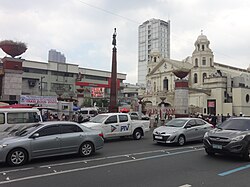Plaza Miranda | |
|---|---|
| Public square | |
 Considered the center of Quiapo, Plaza Miranda is surrounded by several shopping buildings and its most famous landmark, the Quiapo Church. | |
| Dedicated to | José Sandino y Miranda |
| Owner | City of Manila |
| Location | Quezon Boulevard and Hidalgo Street, Quiapo Manila, Philippines |
| Coordinates: 14°35′53″N 120°59′01″E / 14.59806°N 120.98361°E | |
Plaza Miranda is a public square bounded by Quezon Boulevard, Hidalgo Street and Evangelista Street in Quiapo, Manila. It is the plaza which fronts the Minor Basilica and National Shrine of Jesus Nazareno (Quiapo Church), one of the main churches of the City of Manila and is considered the center of Quiapo as a whole. Inaugurated in its current form by Mayor Arsenio Lacson in 1961,[1] it is named after José Sandino y Miranda,[2] who served as the Philippines' Secretary of the Treasury between 1833 and 1854.
Regarded as the center of Philippine political discourse before the imposition of martial law in 1972, the plaza was the site of the 1971 Plaza Miranda bombing, where two grenades were launched at a political rally of the Liberal Party, killing nine people. It later became the venue of the Movement of Concerned Citizens for Civil Liberties (MCCCL) rally led by Sen. Jose W. Diokno on September 21, 1972, where 50,000 people gathered together to protest the impending martial law declaration of the Marcos dictatorship. Martial law was quickly made official hours after the event. It underwent a ₱49 million renovation in 2000 after decades of neglect as a result of Manila's urban decay in the 1970s and 1980s, giving it a more modern design despite protests from various historical groups and cultural experts,[1] with a monument erected to commemorate bombing victims and additional architectural elements installed. Currently, Plaza Miranda serves as a freedom park, where assemblies and protests may be held without needing a permit from local authorities, and with thousands of people crossing through it every day, it is considered Manila's version of Times Square.[1]
Despite fronting the Quiapo Church, Plaza Miranda and the streets surrounding it is known as a center for fortune-telling and the sale of lucky charms and amulets.[3] Most fortune tellers who practice around Plaza Miranda claim that they can draw their ability to tell fortunes from their devotion to the Black Nazarene (the patron of the Quiapo Church) despite Catholic Church doctrine deploring the practice.[4]
- ^ a b c Vergara, Alex Y. (January 2, 2000). "Chin up, Plaza Miranda". Philippine Daily Inquirer. Philippine Daily Inquirer, Inc. Retrieved December 31, 2011.
- ^ "Rename Plaza Miranda after Ramon Magsaysay Sr". Philippine Daily Inquirer. Philippine Daily Inquirer, Inc. June 23, 2007. Archived from the original on July 13, 2015. Retrieved December 31, 2011.
- ^ Arceo-Dumlao, Tina (June 14, 2009). "Quiapo's side streets still lure Pinoys". Philippine Daily Inquirer. Philippine Daily Inquirer, Inc. Archived from the original on June 17, 2009. Retrieved December 31, 2011.
- ^ Andrade, Jeannette (February 2, 2011). "A close encounter with a 'manghuhula' in Quiapo". Philippine Daily Inquirer. Philippine Daily Inquirer, Inc. Archived from the original on January 13, 2012. Retrieved December 31, 2011.